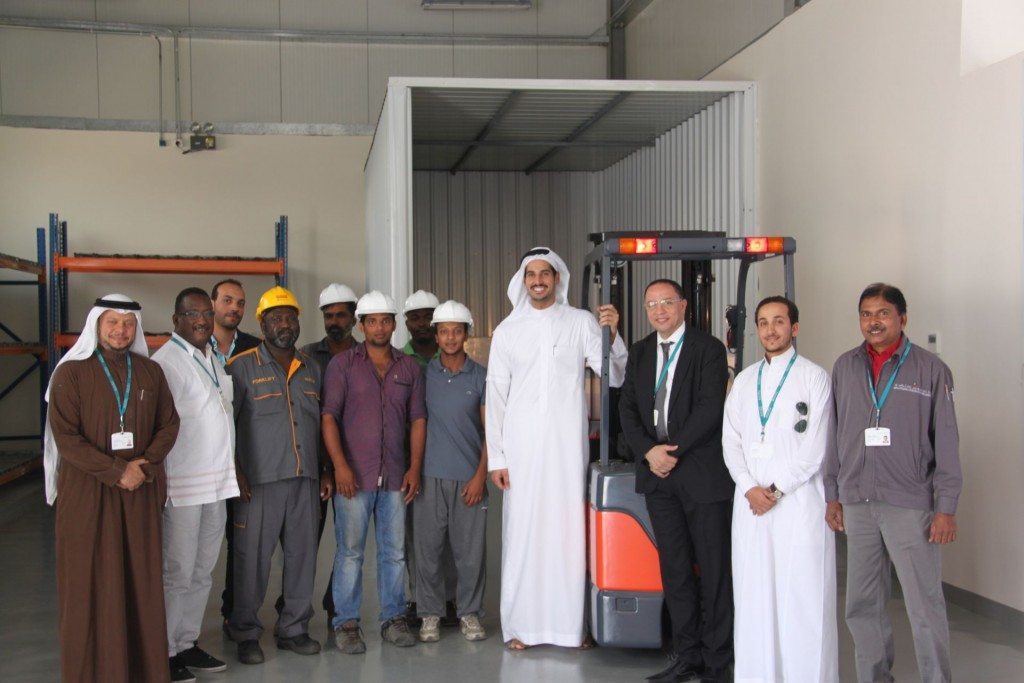Abdul Latif Jameel (ALJ) established itself in the automotive sector in Saudi Arabia by bringing a professional edge to the customer experience after the sale. Recent years has seen this philosophy branch out into other areas of its business including its Industrial Equipment Division which like the car-side of the business sports Toyota in its ranks.
While the Saudisation programme and ensuing government regulation to protect jobs for Saudi nationals has proven to be a challenge for some companies, ALJ has embraced its role as an employer and educator in the Kingdom. It is now rolling out its own training programmes for companies utilising forklifts and the summer saw ALJ open what it describes as a ‘first of its kind’ training facility in the thriving coastal city of Jeddah. The company estimates that for every $100 spent on repairing damaged forklifts from accidents result you are going to have to also fork out an extra $1000 to repair damaged to associated equipment in the warehouse. According to ALJ training is essential to eliminating work place injuries involving forklifts. Studies of forklift specific training show a 70% reduction in operator errors.
ALJ claims through independent studies, confirmed employers who have in place a safety and health training programme experience a 52% lower rate of ‘injury with days away’ than employers without a programme.”
The operator training centre is therefore designed to train operators on the “basis of safe operation and optimisation of forklift and lift productivity and efficiency” among operators.
The centre also serves the aftersales operation of the company by providing a production line of skilled manpower “capable of carrying out the work to the fullest” to its corporate clients.
It also provides a useful role as a trainer and rehabilitator of workers from companies who are increasingly aware of the need for the safe operation of forklifts. The centre also aims to contribute to social development through the training of young people and create jobs in coordination with the Abdul Latif Jameel social initiatives of Bab Rizq Jameel.
The centre consists of three main parts: the driving routes – the warehouse – simulation containers. The centres will be circulated throughout the kingdom. The centre will train between 18-22 trainees per training session, where they are trained theoretically and practically, and the trainee receives a certificate of completion of the session. Dealers and distributors are more and more seeking to offer more than just a phone number for spare parts to their clients. ALJ has proceeded down the route of offering a consultancy-style approach to the buyers of forklift truck fleets, and while training is now a common aspect of running a national scale operation, ALJ’s investment into real estate is a significant addition to the Saudi market.
“One of the main reasons for this is to be able to offer something other than aftersales services to the customer,” says Yousef Shaya Ali Al Qahtani. “We train their people, their operators to work properly on our forklifts. It’s a commitment from our side to provide them with the best services and form a partnership between them and us.”
Yousef says that the feedback from those participating on the training has been overwhelmingly positive: “We’ve had great results from both the management and operators.”
Classes can consist of up to 22 trainees. They are then divided into two or three groups allowing for more concentrated training sessions. Yousef adds that the classes consist of both theory and practical.
“The theoretical part is conducted by one trainer and another trainer provides the practical training,” he says. “The practical training can take up to four hours – two hours inside the warehouse and then two hours outside the warehouse.”
The Jeddah facility is just the start of a programme that will see similarly styled centre opening across the Kingdom.
“This year we are opening in Jeddah, but next and the year after we will be opening up in each region, for example Riyadh, Dammam and the south-east as well.” he explains.
Yousef says that the KSA currently has a lack of fully trained operators and, the risk of injuries apart, he adds that this it is having an impact on the bottom line of companies across the country.
“We can find a solution for customers and their clients so they can reduce their costs. That’s why we have the initiative in the first place: most operators lack the skills and proper training available to them.”
Successful trainees get a certificate on completion on the course, but there is a much longer-lasting legacy potentially at stake here: providing local workers the skills to build a career.
“The main language is English but we back that up with Urdu and Arabic. ALJ has a separate company for community and social responsibility initiatives. We are doing a joint project with them to train young people on the forklifts so we can create jobs for them.”
While he is excited about the course in its current state, Yousef is anticipating even greater things in terms of the development of the certification given at the end of the course.
“Certification by the company is stage one. In stage two we hope to have cooperation with the government to be able to certify with backup from the traffic agency of the ministry of traffic. It’s a matter of time, but I am hopeful.”

